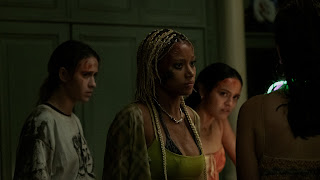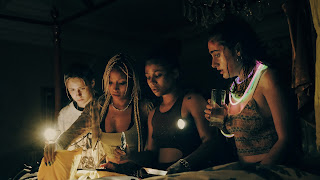This coming Monday marks the 80th anniversary of the bombing of the Amsterdam civil registry office, and this attack on the bevolkingsregister succeeded in destroying some 800,000 identity cards, thus making it much harder for the Nazis to verify the numerous fake IDs that were circulating courtesy of the Dutch resistance. While this daring act saved countless lives, it also led to the execution of a dozen underground members, one of whom was the artist Willem Arondeus. Today, you can view some of Arondeus' fine paintings in the Rijksmuseum, and while the Naarden native's art is discussed in the theatrical cut of John Hay's documentary Willem & Frieda—which screens today and tomorrow at BFI Flare—it is Arondeus' wartime resistance activity that is the main focus of presenter Stephen Fry's enquiries. That said, Arondeus' artistic talent and underground work did intersect as he set about the intricate business of creating stacks of false papers that would, all being well, survive Gestapo scrutiny.
As its title suggests, John Hay's film has another subject in its sights: Frieda Belinfante, the Dutch cellist who also joined the resistance; there, she became firm friends with Willem Arondeus, and the pair worked tirelessly to produce forged documents for those facing Nazi persecution. Remarkably, Belinfante's work with the underground was facilitated by none other than Henry Heineken, who kindly agreed to purchase her cello for a vastly inflated price. At that point in WW2, neither Belinfante nor Heineken had much need of the instrument, but this crucial transaction—which, in present-day terms, involved a handsome six-figure sum—allowed the brewer's accounts to pass muster while granting Belinfante a significant war chest, which she duly ploughed into various resistance activities. Unlike Arondeus, Belinfante was Jewish, but Fry stresses how both artists fought relentlessly against the terrible injustices inflicted by the Nazis. The ultimate fates of the two friends were rather different, however: a couple of years after the war, Belinfante moved to the US, where she died in 1995 at the age of 90; in July 1943, 48-year-old Arondeus was executed by firing squad on the sand dunes just west of Haarlem.
Willem Arondeus pleaded guilty to the attack on the civil registry office and claimed sole responsibility for the explosions—which had been meticulously planned so that no one would be harmed—and it is thought that this may be why two doctors in the group received clemency at the last minute. Of those who organised and carried out the bombing, only Frieda Belinfante eluded the authorities; in the aftermath of Arondeus' death, she carefully edged her way to the safety of Switzerland via Belgium and France (the jaw-dropping story of Belinfante's months spent evading the Nazis is indeed worthy of its own film). While Willem & Frieda sees Arondeus' unwavering devotion to the resistance covered in some detail, we also learn a bit about the man behind these courageous acts: in 1941, the increasingly risky nature of underground activity forced Arondeus to separate from Jan Tijssen, the love of his life, who returned to Apeldoorn, where the two had first met. The couple never saw each other again. In the years that followed, Jan would go on to marry and have a son, poignantly named Willem.
Despite the heroic efforts of Willem and Frieda—and many others on the side of the Dutch resistance—the legacy of the German occupation is borne out by a horrifying statistic: by 1940, the Jewish population of the Netherlands was in excess of 140,000, but at the end of WW2 this figure had been slashed to 40,000, meaning that more than 100,000 Dutch Jews perished over the course of the war. Stephen Fry, who—like so many of us both inside and outside of the Netherlands—knew nothing of the title subjects prior to this documentary, is simply fantastic as our guide through this incredible story, and his personal connection to the material is obvious; whether marvelling at the damage caused to the civil registry office (and Anne Frank's diarising of the event) or recoiling at the compulsory yellow badge used to single out Jews, Fry's sincerity is plain to see. Hay's sobering film is a hugely important work, and it marks a fine way for us to sign off from this year's BFI Flare. Just before we wrap things up, it is perhaps worth mentioning that, in case you missed them, two other Flare 2023 selections—Winter Boy and Monica—were reviewed on the site prior to the festival.
Darren Arnold
Images: Public domain, via Wikimedia Commons

















NGF.jpg)
.jpg)
.jpg)
.jpg)
%20RETOUCH%C3%89E.jpg)